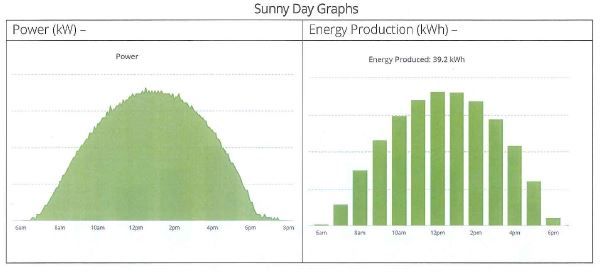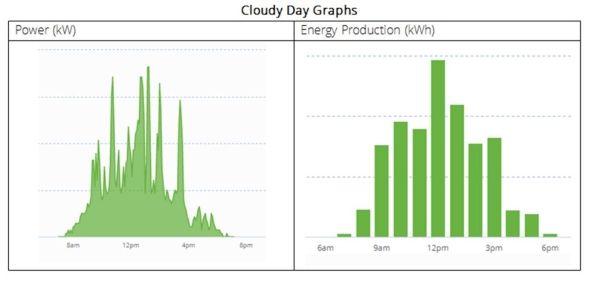Do Solar Panels Work in the Rain?
In sunny southern California, it’s easy to see why going solar can be a smart decision and worthy investment. But what about those not-so-sunny days? How do rain and clouds affect your system’s energy production? How does rain affect solar panels? How well do solar panels work on cloudy days?
- How it works – solar on rainy days

Since solar energy output is directly affected by season and weather variations, it’s obvious why this is a common concern. On a typical clear, sunny day, your system’s power graph forms a bell curve, with the highest energy production around noon, when the sunshine is greatest. Your panels operate most efficiently on these days.

What happens to solar panels when it rains?
Don’t worry—your solar panels still work on cloudy days, since sun rays make their way through rain and clouds. However, because the sunlight is limited, so is production. The amount of electricity generated is dependent on the density of cloud coverage, so your system’s production will be inconsistent and generally reduced on those gloomy days. The good news is SunPower panels are among the best solar panels for cloudy days.
- If I produce less power, will I run out of electricity?
Through net metering, your home remains connected to the electric grid and feeds any surplus electricity to your utility provider. Some local utilities even credit your account for the extra power. Similarly, when your system doesn’t produce enough electricity to power your consumption needs, your home draws power back from the grid.
As you can see, this agreement with the utility proves to be a great advantage on those cloudy days. If you live in a particularly sunny area, the power produced during sunny hours often offsets the energy you use at times when your system is not functioning at full capacity. With efficient, high-quality photovoltaic panels, there’s even less need to worry about your system’s ability to produce enough power for your home.
- What about battery storage?
In addition to keeping the lights on during a power outage, a home battery storage option can also help you use stored energy during less productive periods, like the solar rainy season, rainy days, and even at night. That way you can use more of the power you generate for yourself, rather than selling it to the utilities. But not all batteries are the same. Some are more suitable for occasional use during outages but will wear out quickly if they are “cycled” often – meaning powered up and drained. Your cell phone is an example of a battery that is powered up and drained daily. The life of those batteries is measured in years, not decades. Other batteries can be cycled regularly, and last much longer. Ask your Green Convergence solar consultant about whether battery storage is right for you, and which brand is best for your needs.
How to Use Solar Panels During Rainy Season
Solar systems installed on houses are usually on-grid or on-grid tied systems. You can have two sources of electricity in an on grid solar system: the solar and the electricity provider. At the end of the month, when your solar energy is not performing at its peak during rainy season, you'll be charged for that excess power you used from the utility grid. You will draw electricity from the utility grid to make up for any electricity deficit from your solar panels.
During the summer, when the sun is at its peak, most on grid solar systems generate more power than they need and feed the excess power back into the utility grid during rainy season.
In rainy season, those surplus units of electricity will be credited to your electricity bill, so if you've sized properly, you won't get much electricity bill during rainy season.
For more information on solar energy and a FREE estimate,
contact Green Convergence today.

